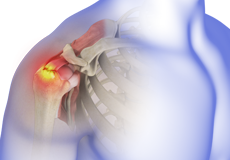
A common cause of pain the shoulder is a rotator cuff tear. A rotator cuff is a group of muscles and tendons around the shoulder joint. When it is injured, it can weaken your shoulder and ache with pain. This type of injury is not only painful, but often inconvenient and makes daily activities difficult.
A torn rotator cuff can happen from an injury or degenerative issues. When it happens from an injury, it is commonly through repeated movements while playing sports, performing a job function or doing common household chores. Degenerative tears occur from the wearing down of the tendon that occurs slowly over time and naturally happens as we age.
Symptoms of a rotator cuff tear may include:
- A dull ache in your shoulder
- Pain with certain movements
- Limited range of motion
- Pain gets worse when you try to sleep on the injured side
- Muscle weakness in the arm
- Shoulder pain the worsens over time
- Crackling sensation when your shoulder moves in certain directions
Ways to help prevent a rotator cuff tear include:
- Exercise with focus on both the front muscles of the chest, shoulder, upper arm and back of the shoulder
- Stretch and warm up prior to activity
- Use proper form and safe lifting techniques
- Take frequent breaks
Treatment options for a rotator cuff tear:
Conservative treatments for a torn rotator cuff including rest, joint immobilization and physical therapy are sometimes all that is needed to find relief. Regenerative medicine is another non-invasive treatment option to talk with your doctor about. If the injury is severe, surgery may need to be considered.
Shoulder injuries such as a torn rotator cuff should be treated immediately to prevent further damage and to begin the healing process as soon as possible. See a physician right away if you have a sudden loss of motion after an injury, as you could have a substantial rotator cuff tear. If you have pain lasting longer than a few weeks or you’ve been formally diagnosed with a rotator cuff tear, you should see a shoulder specialist.
Source: Miller Orthopedic Specialists






